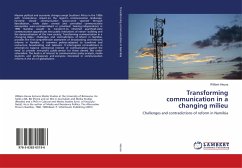Massive political and economic changes swept Southern Africa in the 1990s with tremendous impact on the region's communication landscape. Formerly 'closed' communication spaces were 'opened' through liberalisation, while state- owned and controlled communication monopolies were commercialised or privatised. Gaining independence in 1990 Namibia sought to transform its inherited apartheid-state communication apparatuses into public institutions of nation- building and the democratisation of the 'new society'. Transforming communication in a changing milieu: challenges and contradictions of reform in Namibia, provides the first comprehensive assessment of broadcasting and telecoms reforms in Namibia. It examines policies adopted to transform and restructure broadcasting and telecoms. It interrogates contradictions in attempts to balance commercial interest of communication against the need to provide non-profit public service for those denied this under colonialism. The book is of interest to communication policy analysts, media students and professionals and everyone interested in communication reforms in the era of globalisation.
Bitte wählen Sie Ihr Anliegen aus.
Rechnungen
Retourenschein anfordern
Bestellstatus
Storno








